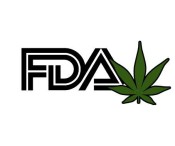For the first time, a marijuana-derived drug easily passed a Phase III trial, significantly reducing the number of seizures that children with a severe form of epilepsy suffered. This means that the drug, Epidiolex, may become the first to win US approval.
Shares in the British company, GW Pharma, soared, more than doubling on the stock market following the news.
The active ingredient in Epidiolex is cannabidiol, which is extracted from marijuana plants and does not include the components that cause the “high.” The FDA has already approved two drugs with THC, another marijuana derivative, but this would be the first, if approved, with cannabidiol. All of these extracted drugs are made without including any psychoactive components of the plant.
The drug is targeted to treat children with Dravet syndrome. In this rare form of childhood epilepsy, seizures begin early, and can cause developmental difficulties. More than 300 children with severe epilepsy are already receiving Epidiolex, thanks to an expanded access program, which allows patients with certain diseases to get early access to promising drugs that have not completed the approval process. A significant proportion of patients benefit from the drug.
Other commonly-used drugs do not help more than a hundred thousand children with Dravet and other disorders. Parents often turn to medical marijuana dispensaries for extracts and oils.
Despite anecdotal accounts for years about marijuana’s efficacy as medical treatment, this test provides a rigorous demonstration of proof in this area of severe epilepsy. Epidiolex would be the first drug specifically designed for Dravet syndrome. Dravet doesn’t respond well to other medications.
Mary Anne Meskis, executive director of the Dravet Syndrome Foundation, a nonprofit dedicated to raising funds for research into the condition, said the results “bring much needed hope to the children and families who have been living with these debilitating seizures.”
GW Pharma has mounted a rigorous effort to develop proven medical uses for marijuana and cannaboids. It has passed or is near passing trials for marijuana-derived drugs for multiple sclerosis and other severe-epilepsy related trials. “The results of this… trial are important and exciting, as they represent the first placebo-controlled evidence to support the safety and efficacy of pharmaceutical cannabidiol in children with Draven syndrome,” Orrin Devinsky, a doctor at NYU Langone Medical Center’s Comprehensive Epilepsy Center, said in a statement released by GW Pharmaceuticals.
If Epidiolex does win regulatory approval, it is it hard to imagine that this would not lead to a re-evaluation of marijuana’s status as a Schedule I drug, with no redeeming medical value. However, the opposite may be true: cannabis-derived drugs like Epidiolex may receive a Schedule II or III classification, while the FDA continues to refuse to re-classify marijuana itself.
